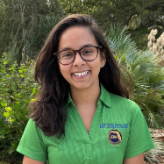4-H Embryology
Spring Semester Only
Youth are naturally curious about the world around them. This curiosity provides a wonderful opportunity to develop an understanding of biological concepts. The Florida 4-H Embryology curriculum was developed using an experiential learning model that engaged youth in the learning process. Students will learn by experimenting, recording data, and applying their knowledge to real-world situations. During the 21-day incubation period of chicken eggs, students learn about embryonic development and the life cycle. Youth are responsible for looking after the eggs, observing the hatching, and then caring for the newborn chicks for a span of 2-3 days.
An additional goal with our curriculum is the development of life skills. The activities in this curriculum give students the opportunity to develop skills pertaining to critical thinking, record keeping, planning, and science protocols.
Teacher Resources
-
Introduction to Embryology (Teachers)
This video introduces the Florida 4-H embryology program and discusses some of the key points children can learn by watching eggs hatch in the classroom.
-
Incubator
An incubator is key to an effective embryology project. In this module, Chris explains what types of eggs you can use, how incubators work and offers some great tips when working with eggs in an incubator.
-
Brooder
A brooder is basically a container that can be used to keep the baby chicks safe and warm after they have hatched. In this module, Andy demonstrates the types of brooders that are available, what to consider for feeding, watering and warming the chicks and when to move the chicks into the brooder.
-
Candling Eggs
A candler provides the ability to look inside the fertilized egg and check its progress. In this segment, Chris shows how to use a candler and what to look for to see if the eggs are fertilized or not.
-
Introduction to Embryology (Students)
This video is a primer for kids to help them understand what embryology is all about. Mr. Andy, the local 4-H agent, visits with Farmer Chris to learn what type of equipment and tools are used in an embryology project.
-
FAQs
Here are some answers to some frequently asked questions that are asked about the embryology program. For more questions you may have, please visit the Resources page and check out the Curriculum link, 2nd-5th Graders.
Meet Your Agents
Marcus Boston
-164x164.png)






